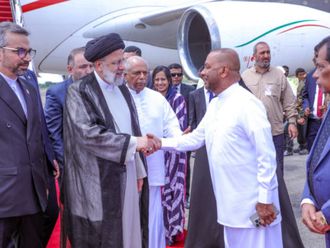Ramallah: The European Union and Israel are expected to immediately start negotiations over Israeli actions in the West Bank, with the EU delivering a sharp message to Israel focusing on the latter’s actions which have created a “focused and increasing threat to the possibility of the two-state solution.”
An internal EU document has recommended the 28 member states start negotiations with Israel on what the EU termed as ‘red lines’ in the West Bank with the purpose of preventing a series of Israeli moves that could jeopardise the creation of a Palestinian state.
The document obtained by Israeli daily Haaretz, states that “the EU considers the preservation of the two-state solution a priority. The only way to resolve the conflict is through an agreement that ends the occupation, which began in 1967, that ends all claims and fulfils the aspirations of both parties. A one state reality would not be compatible with these aspirations.”
The EU has instructed its ambassador to Israel, Lars Faaborg-Andersen, to deliver the message to Israel that the union wants to negotiate about a number of issues.
According to the EU, Israeli construction in the Givat Hamatos neighbourhood beyond the Green Line in occupied Jerusalem, construction in the E1 area between Ma’aleh Adumim and occupied Jerusalem, further construction in Har Homa neighbourhood in occupied Jerusalem beyond the Green Line, the relocation of 12,000 Bedouin Palestinians without their consent in a new town in the Jordan Valley (expelling them from land in the West Bank including E1) and harming the status quo at Al Haram Al Sharif are all Israeli attempts to create instability and increase tensions. The EU said it would hold a “thorough discussion” with Israel on these issues and other issues related to the Palestinian occupied territories.
‘Key investor’
“The EU is a key investor in Palestinian capacity and state building, as appreciated by Israel itself, and is also contributing to address Palestinian humanitarian and development needs, and also contributing to create the conditions for a viable Palestinian state,” the document read.
“Israel must be presented with specific sanctions to be levelled if Israel takes specific actions so that there won’t be any surprises and the price is clear,” European diplomats told Haaretz.
Israeli officials in the Foreign Ministry are concerned the negotiations with the EU are a prelude to further European sanctions against Israel.
As a result of this international stance, the Israeli Justice Minister Tzipi Livni, Chief Israeli negotiator and Chairwoman of the Hatnua party and Finance Minster and chairman of the Yesh Atid party Yair Lapid joined forces and formed a 25-member Knesset diplomatic bloc to advance the revival of peace talks with the Palestinians.
The Israeli daily the Yediot Ahranoth reported on Wednesday that the bloc will be active in the winter Knesset session which starts next week.
“The bloc will work together against ‘Danny Danonism’ and against the extreme nationalism,” Livni said. “I recently had talks with Yair Lapid. He is the same mind as me in what I am saying.”
Lapid said: “We have to be united and more coordinated.”
The new bloc (consisting of 19 from Yesh Atid and 6 from Hatnua) will act inside the coalition of 68 members of the Knesset led by Benjamin Netanyahu. The Knesset has 120 members, according to regulations the prime minister should have a majority of 61 members to form a government.












